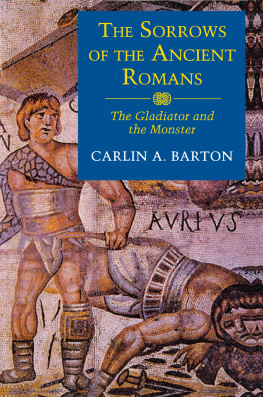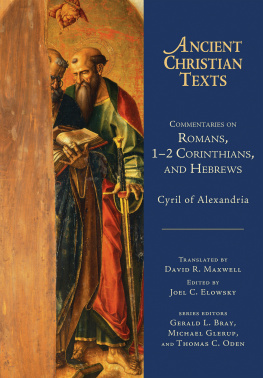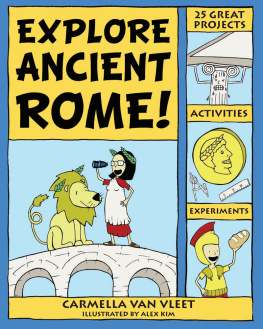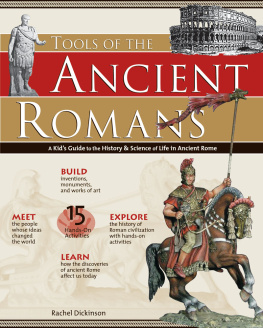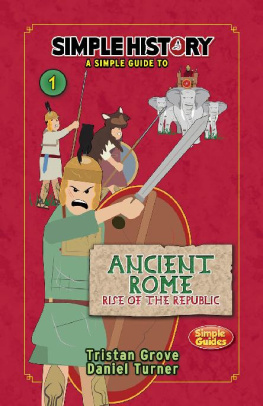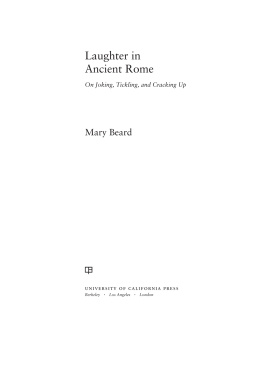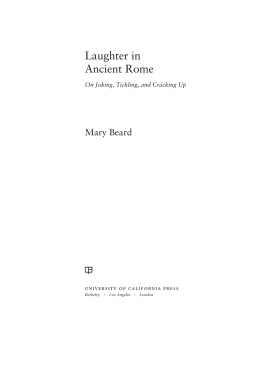MORE THAN TWO THOUSAND YEARS ago, at a time when the people in the British Isles and in most parts of Western Europe were living the lives of savages, occupied in fighting, hunting, and fishing, dwelling in rude huts, clad in skins, ignorant of everything that we call civilization, Rome was the centre of a world in many ways as civilized as ours is now, over which the Roman people ruled. The men who dwelt in this one city, built on seven hills on the banks of the river Tiber, gradually conquered all Italy. Then they became masters of the lands round the Mediterranean Sea: of Northern Africa and of Spain, of Greece, Egypt, Asia Minor and the Near East, and of Western Europe. The greatness of Rome and of the Roman people does not lie, however, in their conquests. In the end their conquests ruined them. It lies in the character, mind, and will of the Romans themselves.
In the history of the ancient world the Romans played the part that men of our race have played in the history of the modern world. They knew, as we claim to know, how to govern: how to govern themselves, and how to govern other people. To this day much in our laws and in our system of government bears a Roman stamp. They were great soldiers and could conquer: they could also hold and keep their conquests and impress the Roman stamp on all the peoples over whom they ruled. Their stamp is still upon us. Much that belongs to our common life to-day comes to us from them: in their day they lived a life not much unlike ours now. And in many respects the Roman character was like the British. We can see the faults of the Romans, if we cannot see our own; we can also see the virtues. We can see, toolooking back at them over the distance of time, judging them by their work and by what is left to us of their writingshow the mixture of faults in their virtues explains the fall as well as the rise of the great power of Rome.
The Romans were men of action, not dreamers. They were more interested in doing things than in understanding them. They were men of strong will and cool mind, who looked out upon the world as they saw it and, for the most part, did not wonder much about how and why it came to be there. It was there for them to rule. That was what interested them. Ideas they mostly got from other people, especially from the Greeks. When they had got them they could use them and turn them to something of their own. But they were not distracted by puzzling over ideas. Their religion was that of a practical people. In the later days of Rome few educated men believed in the gods. But all the ceremonies and festivals were dedicated to them; and magnificent temples in their honour were erected in which their spirits were supposed to dwell. In the old days every Roman household had its particular imagesthe Lares and Penates which the head of the family tended and guarded. Connected with this office was the sacred authority of the head of the familythe paterfamilias. His word was law for the members of the household. And the City of Rome stood to its citizens in the place of the paterfamilias. The first laws of a Romans life were his duty to his father and to the State. They had an absolute claim on him for all that he could give. The Romans code of honour, like the Englishmans, rested on this sense of duty. A man must be worthy of his ancestors and of Rome. His own life was short, and without honour nothing; the life of Rome went on.
Courage, devotion to duty, strength of will, a great power of silence, a sense of justice rather than any sympathy in his dealings with other men: these were the characteristic Roman virtues. The Roman was proud: he had a high idea of what was due from himself. This was the groundwork out of which his other qualities grew, good and bad. Proud men are not apt to understand the weakness of other people or to appreciate virtues different from their own. The defects of the Romans were therefore hardness, sometimes amounting to cruelty both in action and in judgement; lack of imagination; a blindness to the things in life that cannot be seen or measured. They were just rather than generous. They trampled on the defeated and scorned what they could not understand. They worshipped success and cared little for human suffering. About this, however, they were honest. Sentimentalism was not a Roman vice, nor hypocrisy. When great wealth poured into the city, after the Eastern conquests of Lucullus and Pompeius, the simplicity of the old Roman life was destroyed and men began to care for nothing but luxury, show, and all the visible signs of power. They were quite open about it: they did not pretend that they really cared for other things, or talk about the burden of Empire.
The heroes of Roman history are men of action. As they pass before us, so far as we can see their faces, hear their voices, know their natures from the stories recorded by those who wrote them down at the time or later, these men stand out in many respects astonishingly like the men of our own day, good and bad. Centuries of dust lie over them. Their bones are crumbled to the dust. Yet in a sense they live still and move among us. Between them and us there lie not only centuries but the great tide of ruin that swept the ancient world away: destroyed it so that the men who came after had to build the house of civilization, stone by stone anew, from the foundation. The Roman world was blotted out by the barbarians. For hundreds of years the kind of life men had lived in Rome disappeared altogether and the very records of it seemed to be lost. Gradually, bit by bit, the story has been pieced together, and the men of two thousand years ago stand before us: we see them across the gulf. The faces of those belonging to the earliest story of Rome are rather dim. But they, too, help us to understand what the Romans were like. We learn to know a people from the men it chooses as its heroes; about whom fathers tell stories to their children. They show what are the deeds and qualities they admire: what kind of men they are trying to be.
THE OLDEST ROMAN STORIES GIVE a description of the coming of the people who afterwards inhabited the city, from across the seas. They tell of the founding of the first township round the Seven Hills, and of the kings, especially of the last seven, who ruled over the people until, for their misdeeds, they were driven out and the very name of King became hateful in Roman ears. Then there are many tales of the wars between the people of Rome and the neighbours dwelling round them on the plains of Latium and among the hills of Etruria and Samnium; and the fierce battles fought against the Gauls who, from time to time, swept down on Italy from the mountains of the north.
These stories do not tell us much that can be considered as actual history. But they do help us to understand what the Romans wished to be like, by showing us the sort of pictures they held up before themselves.



